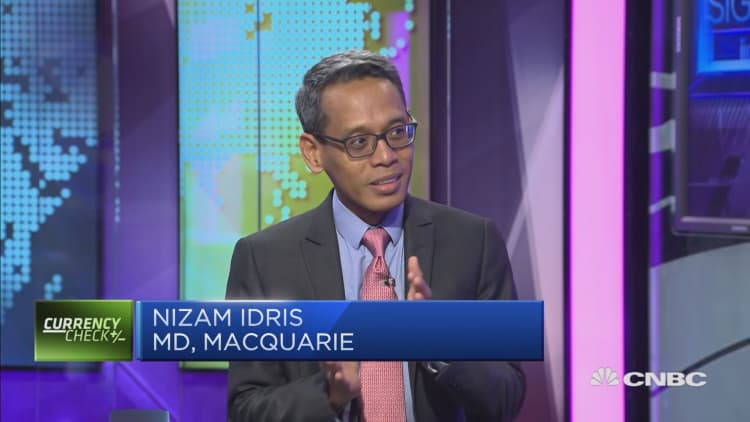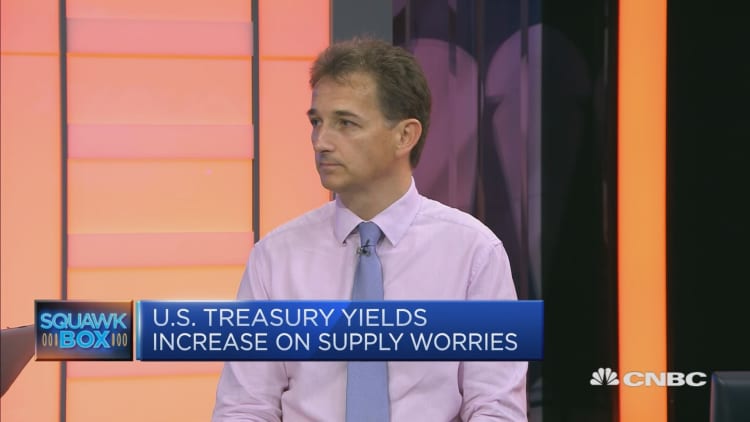The Japanese yen's rapid appreciation since the start of 2018 has made it one of the best-performing currencies so far — and there's room for further strengthening.
The yen is expected to stay strong partly due to weakness in the U.S. dollar, which has made the greenback less attractive as a "safe haven" asset. As a result, the pair has traded down by 4.73 percent between Jan. 1 and Feb. 27.
A number of research houses, including Morgan Stanley and ING, have predict that the pair will continue trending downward.
"We see further room for JPY (Japanese yen) appreciation," Morgan Stanley analysts wrote in a report last week. They expect the U.S. dollar to trade at 101 yen by the final quarter of the year, down from 112.64 yen at the start of 2018.
"JPY offers better investment prospects in our view and is more emblematic of a safe-haven currency than the USD at this point," the analysts added.
Bond yields rise — but the dollar does not
The dollar index, which measures the greenback against a basket of major currencies, has been on a decline since December 2016. That weakness is expected to remain even when bond yields in the U.S. rise, noted Morgan Stanley.
U.S. Treasury yields and the dollar have traditionally rise and fall in tandem, but the correlation between the two has weakened recently. In contrast to the decline in the dollar index, the 10-year Treasury yield has been rising in the last few months, inching closer to 3 percent.

One reason for that disconnect is the rising fiscal deficit in the world's largest economy, Morgan Stanley said. The U.S. government has issued more bonds to raise funds, and that increase in Treasury supply has compressed bond prices and raised yields.
With stiffer competition for funds globally, the U.S. "will have to offer higher rates or a cheaper FX (foreign exchange) rate" to get the money it needs, the bank said. Expectations for the dollar to still be weak this year mean the yen would continue to be investors' preferred buy during times of market turbulence.
'Strongest of the major currencies'
The weakness in the greenback is not the only reason behind the appreciation in yen. A robust Japanese economy has played a part in propping up the currency, according to the Economist Intelligence Unit.
Japan, the world's third-largest economy, posted its eighth straight quarter of growth in the three-months to December 2017 — the longest streak of expansion in nearly 30 years.
"One of the upside surprises in the global economy in 2017 was the strong performance of Japan, which benefited from strong global demand for its exports, extra government spending and lots of liquidity from the Bank of Japan," EIU's chief economist Simon Baptist wrote in a recent note.
Baptist went as far as saying that "the yen will be the strongest of the major currencies this year."
'Talking down' the yen
But a strong yen and weak U.S. dollar has the potential of hurting profitability of Japanese exporters, especially when more than half of the country's exports are contracted in U.S. dollar, said Harumi Taguchi, principal economist at IHS Markit.

The strength in yen, if sustained, could also dampen prices and derail Japan's efforts to meet its 2 percent inflation target. The Bank of Japan has made monetary conditions loose to spur spending and investments, yet inflation has remained below target.
"Further rapid yen appreciation will probably lead to verbal intervention or talking down of the currency by policymakers," said Taguchi, who expects the yen to "gradually weaken."
She explained that positive economic data from the U.S. would help to stabilize financial markets, limiting the flight to safe haven assets such as the yen. In addition, strong corporate earnings in the U.S. and greater certainty from the Federal Reserve would eventually support the greenback, she added.


